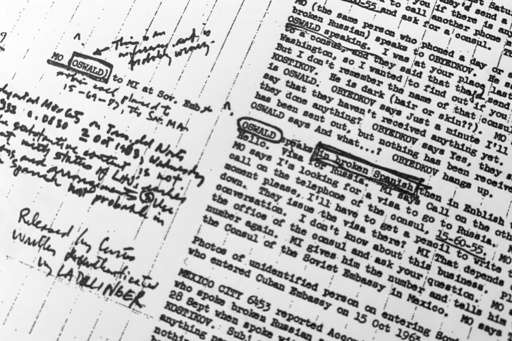
DALLAS — On Tuesday, the FBI announced that it has identified 2,400 new records concerning the assassination of former President John F. Kennedy. This announcement comes as various federal agencies strive to meet the requirements of an executive order signed by President Donald Trump last month, which mandated the release of a significant number of documents.
The FBI is coordinating the transfer of these newly found records to the National Archives and Records Administration (NARA), where they will be processed for declassification. In the early 1990s, a federal statute required that all documentation pertinent to Kennedy’s assassination, which occurred on November 22, 1963, be compiled into a centralized collection at NARA. Although a large portion of this collection—comprising over 5 million pages—has been released publicly, researchers estimate that approximately 3,000 files still remain undisclosed, either completely or in part.
While the FBI has not specified the type of content included in these newly discovered documents, the agency has been engaged in an extensive project since 2020 to modernize its records management by opening a Central Records Complex. This initiative aims to electronically inventory and transport closed case files from various field offices nationwide. Improved inventory management and technological advancements have enabled the FBI to effectively conduct comprehensive searches for records.
Jefferson Morley, who serves as vice president of the Mary Ferrell Foundation—a repository dedicated to documents related to the Kennedy assassination—described the FBI’s announcement about the files as “refreshingly candid.” He praised the agency’s move towards transparency, stating that it sets a precedent for other governmental organizations that may also need to disclose outstanding documents.
Trump’s executive order from last month prompted the national intelligence director and the attorney general to formulate a strategy for releasing classified materials tied to Kennedy’s assassination. A spokesperson for the Office of the Director of National Intelligence confirmed that a release plan has been submitted as directed, although no further details or timelines were provided regarding when the public might gain access to these records.
The legislation required that this collection be made available to the public by 2017, barring any exceptions approved by the president. In his initial term, Trump indicated intentions to release all remaining records, but he later decided to withhold certain files for national security reasons. Files continue to be released under the administration of President Biden, yet many records remain unseen.
Kennedy’s assassination has been the subject of various conspiracy theories for many years. He was shot and killed in downtown Dallas while his motorcade passed in front of the Texas School Book Depository, where 24-year-old Lee Harvey Oswald fired from a sniper’s position on the sixth floor. Two days post-assassination, nightclub owner Jack Ruby fatally shot Oswald during a transfer from jail.
The Warren Commission, formed by President Lyndon B. Johnson to look into the assassination, concluded that Oswald acted independently and that there was no supporting evidence for a conspiracy. Despite this, alternative theories have proliferated over time.
Gerald Posner, the author of “Case Closed,” which asserts that Oswald acted alone, noted that it’s possible that the newly found records may simply be duplicates of documents already held by the National Archives. He commented that if these are genuinely new documents concerning the assassination, it raises significant questions about how they eluded discovery for so long. “The intriguing aspect would be if they relate to Oswald or the ongoing investigation,” Posner stated.
Over recent years, documents released from this collection have provided insights into the workings of intelligence agencies at the time, including CIA memos and cables discussing Oswald’s visits to the Soviet and Cuban embassies shortly before the assassination. Previously, Oswald had defected to the Soviet Union before making his way back to Texas. Morley remarked that the CIA’s surveillance of Oswald is a crucial emerging narrative that has been gaining attention, suggesting that the new files could also contain relevant information on this topic.

